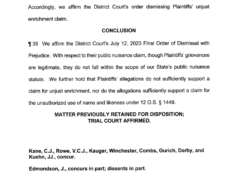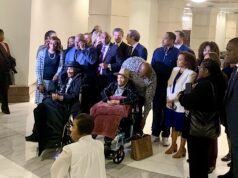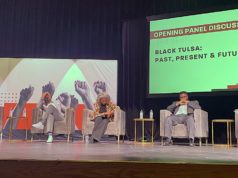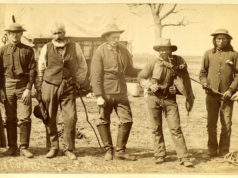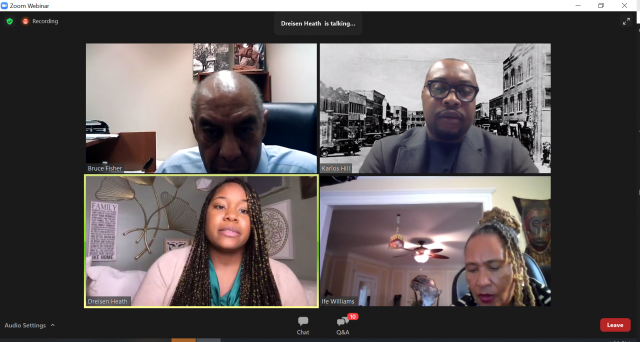

The University of Oklahoma’s College of Law hosted a virtual event today where panelists presented on the need for more education about the history of the 1921 Tulsa Race Massacre and the importance of immediate reparations.
The event, Reparations and the Tulsa Race Massacre, was moderated by Karlos Hill, chairman and associate professor of the Clara Luper Department of African and African American Studies at the University of Oklahoma.
The panel featured three speakers: Ife Williams, associate professor of political science at Delaware County Community College, Pennsylvania; Bruce Fisher, Oklahoma Historical Society administrative program officer and son of civil rights trailblazer Ada Lois Sipuel Fisher; and Dreisen Heath, Human Rights Watch assistant researcher and advocate.
Throughout the discussion, each panelist presented arguments for the importance of reparations — the provision of money or other resources to make amends for an action — and how they should be provided immediately for the victims, survivors and descendants of the massacre.
The 1921 Tulsa Race Massacre is a significant part of Oklahoma’s history and is known as one of the worst incidents of racial violence in America, with impacts that are still felt today.
A 2001 study completed by the Oklahoma Commission to Study the Tulsa Race Riot of 1992, which collected oral accounts from more than 50 survivors, included five recommendations for institutions: reparations to be paid directly to the remaining survivors; reparations to be paid to descendants of deceased survivors; the creation of a scholarship fund to aid students affected by the race massacre; the designation of an economic development enterprise zone in the Greenwood District; the creation of a memorial for the reburial of any human remains found in the search for unmarked graves.
“Those recommendations were largely ignored — and kept largely ignored — by the Oklahoma State Legislature and the City of Tulsa,” Hill said.
Williams discussed the global history of reparations in four distinct areas: the transatlantic slave trade, enslavement, post-slavery segregation and colonialism. She also discussed the effects of trauma passed down through generations.
Williams told a story about how her mother saw her cousin being lynched.
“[My mother] could not sleep for months,” Williams said. “This is the terror we relive every time we see Black bodies being violated in the streets. It’s ancestral terror going on and on.”
‘Trauma, I guess’
During Tuesday’s discussion, Heath said there are three known living survivors of the Tulsa Race Massacre and “hundreds of descendants all enduring the pain of being denied justice, repair and healing throughout their lifetime.”
“These impacts clearly have caused trauma, psychological and emotional damage to descendants, to living survivors, to the broader community at large trying to wrestle with the ongoing impacts of something that was so destructive and has a clear imprint on the city today,” Heath said.
Fisher played a 1999 video of testimonies from survivors of the Tulsa Race Massacre.
One testimony was from Kenny Booker, who told a story of how white men ran around his neighborhood setting homes on fire. Another man, Edward Lett, said in his testimony that his father and grandfather were shot by a white man in front of him and his mother while they were trying to leave town.
“From then on I can’t remember really how my mother managed,” Lett said in the video.
Fisher said his grandmother was six months pregnant with his uncle when the Tulsa Race Massacre took place.
“It gives me a sense of grief to know that my grandmother had to endure that horrible event while six months pregnant with my uncle,” Fisher said.
He said he learned of the stories from his mother while expressing the importance of preserving the history. He said he wishes more of the stories his grandmother told his mother were still able to be told.
“It just amazes me that something as horrific as this occurred and it is not a continuing need to share this with other people,” Fisher said. “People wonder how did this story get kept secret for so long? And I don’t know how to answer that question. Trauma, I guess.”
Williams said to be able to get legislation passed to achieve reparations, there needs to be more education and civic engagement on the damage done.
“The solution has to be long term, and I don’t America is ready for that commitment,” Fisher said.
Williams said there are layers of remedies that need to be considered — not with just a dollar amount, but holistically.
“We are suffering,” Williams said. “A victory in Tulsa is a victory for the world. Because what it’s going to do is make a standard for the rest of us.”










